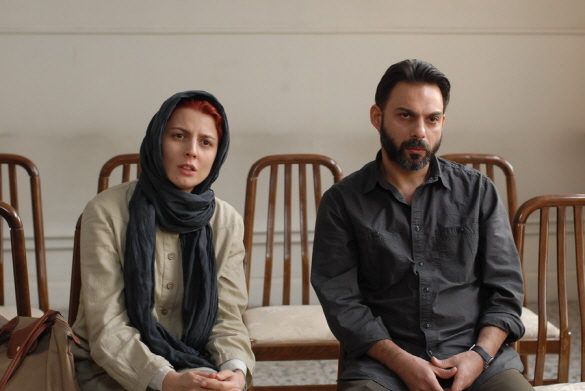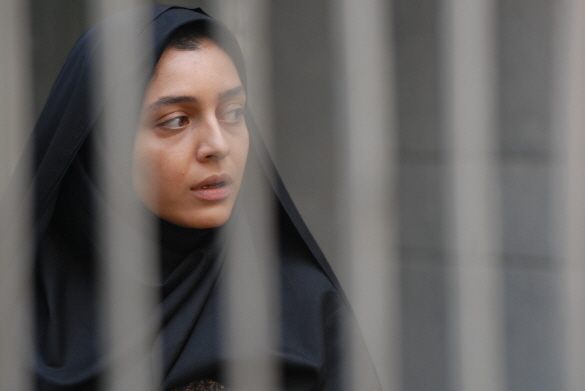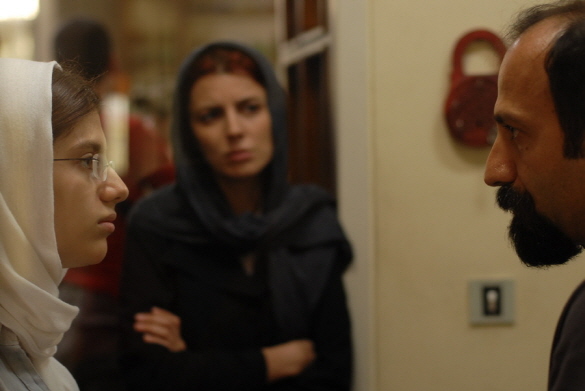 None of the characters is a villain in their complex human conflict in an Iranian domestic drama film “A Separation”. Each of them has each own priority among the moral/ethical/religious values in their world, and the difference between their views causes many clashes throughout the story. They decide to settle their problem in the court as we do sometimes, but, in the court where everything is defined into a simple matter of right and wrong, their situation only gets more complicated and uglier for everyone associated with this matter – and there are casualties hurt by the process.
None of the characters is a villain in their complex human conflict in an Iranian domestic drama film “A Separation”. Each of them has each own priority among the moral/ethical/religious values in their world, and the difference between their views causes many clashes throughout the story. They decide to settle their problem in the court as we do sometimes, but, in the court where everything is defined into a simple matter of right and wrong, their situation only gets more complicated and uglier for everyone associated with this matter – and there are casualties hurt by the process.
When we meet a middle-class couple Nader(Peyman Moaadi) and Simin(Leila Hatami) for the first time, they are in front of the judge not shown on the screen. To the judge(and us), they explain the reason behind their divorce. They have lived together for 14 years without a big problem, and they like each other, but now they have a huge disagreement over their plan. They decided to immigrate, but Nader gives up the plan at the last minute because of his senile father he has to take care of. Because they finally get the permission papers, Simin cannot accept that. She wants a better life for not only herself but also for their young adolescent daughter, Termeh(Sarina Farhadi).
Anyway, based on the agreement from both, their divorce is granted while who gets the custody of Termer is remained unsettled. Simin moves out of their house and stays at her mother’s home. Nader stays with his daughter. Because Simin has tended to his father(Ali-Asghar Shahbazi), Nader needs someone else to look after him, so he hires a woman named Razieh(Sareh Bayat), who comes to his house with her little daughter.
Razieh does not like much what she has to do. When she has to change old man’s clothes after he soils his pants, she calls some religious man and anxiously asks him whether it is all right to do that. She is not even comfortable about being with her employer, who is not her husband, though it is just for few minutes. The salary is low, but she needs the money for her poor family, In addition, she is pregnant – but she does not tell it to Nader.
 Now I should be more discreet about describing the plot, for it is gripping to watch how the plot gets thickened and multi-layered by a couple of incidents which happen on one day. I will not go into the details, but let’s say the damages are done to both sides and both Nader and Hodjat(Shahab Hosseini), Razieh’s volatile husband, become angry. Their conflict could have been resolved easily, but both of them stubbornly refuse to step back, so they go to the court to settle the matter.
Now I should be more discreet about describing the plot, for it is gripping to watch how the plot gets thickened and multi-layered by a couple of incidents which happen on one day. I will not go into the details, but let’s say the damages are done to both sides and both Nader and Hodjat(Shahab Hosseini), Razieh’s volatile husband, become angry. Their conflict could have been resolved easily, but both of them stubbornly refuse to step back, so they go to the court to settle the matter.
However, the questions about the surrounding circumstances as well as the incidents themselves on that day are hard to answer for everyone. For example, did Nader really not know about Razieh’s pregnancy? Or, what really happened when he angrily pushed her outside his home? There seems to be no end in the arguments between Nader and Hodjat; everyone gets more frustrated and conflicted over the matters of religion, ethics, and family loyalty in this lawsuit.
While taking no side, the director/writer Asghar Farhadi equally treats his characters without judgments. Nobody is entirely clean or mean in this increasingly complex situation. As the time goes by, nobody is sure about what happened even when they try to recreate the situation. Furthermore, the matter becomes far more serious than they thought because they brought the matter to the court. Both Nader and Hodjat realize they can go to the jail if they are not careful in their shifty situation – so they rather stick to their respective versions of what happened on that day.
 With the movie’s unobtrusively intimate approach to the characters, while we are frustrated and maddened by their behaviors, our sympathy is pulled to every side – even to Hodjat, the most disagreeable character, who admits “I just lose my control too soon.” Hodjat is unemployed and depressed while mired in the debts, and he feels more humiliated because of what happened to his wife, but he is at least decent enough to direct his anger toward himself, not her. In case of Nader, we understand his anger because he does care about his father(but his father does not remember him now; he looks for Samin). However, as a man who has more options than his opponent, he should have been more thoughtful when a good opportunity to resolve the conflict comes to him in time. Samin and Razieh do their best to solve the problem, but, even when they openly talk with each other about their matter, they more realize how much they and their husbands are entangled in the difficult situation. All of them should take some compromise of each own if they want to settle their matter, but can they do that?
With the movie’s unobtrusively intimate approach to the characters, while we are frustrated and maddened by their behaviors, our sympathy is pulled to every side – even to Hodjat, the most disagreeable character, who admits “I just lose my control too soon.” Hodjat is unemployed and depressed while mired in the debts, and he feels more humiliated because of what happened to his wife, but he is at least decent enough to direct his anger toward himself, not her. In case of Nader, we understand his anger because he does care about his father(but his father does not remember him now; he looks for Samin). However, as a man who has more options than his opponent, he should have been more thoughtful when a good opportunity to resolve the conflict comes to him in time. Samin and Razieh do their best to solve the problem, but, even when they openly talk with each other about their matter, they more realize how much they and their husbands are entangled in the difficult situation. All of them should take some compromise of each own if they want to settle their matter, but can they do that?
Through the realistic presentation of their compelling story, Farhadi also allows the audiences observe several specific sides of the Iranian society including class, religion, and custom. The most interesting part to me is how the legal system works, represented by the interrogator(Babak Karimi) who takes care of the case. His work is proceeded in a rather informal way in a small room with his desk and several chairs, and he even wears causal clothes. His stern but weary bureaucratic attitude to both sides implies that he has seen that kind of case before many times; he’d rather see them settling the matter by themselves.
Along with Golden Bear award at Berlin International Film Festival early in this year, the film also won a Silver Bear award for the acting ensemble. Four principle performers, Moaadi, Bayat, Hatami, and Hosseini, do deserve the award. There are many interaction scenes between them with lots of dialogues, and they never miss a beat even in their most emotionally intensive moments. Sarina Farhadi, Farhadi’s daughter, is also very good as a young girl who struggles through adolescent pain amplified by her parents’ separation and following complications. There is a crucial scene near the ending where she must answer a certain question. From her face, we know how hard it is for her to answer to that.
“A Separation” is a seemingly simple tale which is unfolded into something a lot more complex we expected, with several questions to think about. The title seems to be misleading, but, as the unfolded story is effortlessly folded back to itself in the end, we realize the title is very appropriate for the situation of the characters in the film. Sometimes, it is a lot better to settle the matter outside the court with compromise and understanding, rather than to hurt others inside the court.








For a movie to be Iranian, that enigmatic country, is some reason to arouse curiosity, and that too with issues like divorce. Can the world be shrinking so fast soon there will be no mystery left and the whole world will an extension of Manhattan.
SC: What will happen next between people separated by mystery is unpredictable instead.
Yes. People are a different matter. The human brain is said to be the most complex piece of matter in the universe. The mind and spirit, exponentially more.
Pingback: 10 movies of the 2010s – and more: Part 2 | Seongyong's Private Place